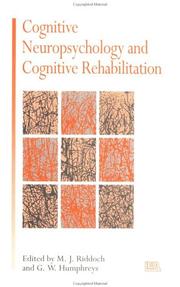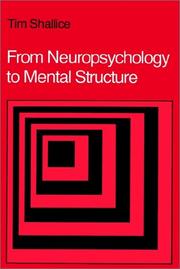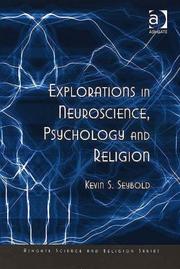| Listing 1 - 9 of 9 |
Sort by
|

ISBN: 0863772919 9780863772917 Year: 1994 Publisher: Hove Erlbaum
Abstract | Keywords | Export | Availability | Bookmark
 Loading...
Loading...Choose an application
- Reference Manager
- EndNote
- RefWorks (Direct export to RefWorks)
Over the past 15 years there have been significant advances in cognitive analysis of many neuropsychological syndromes. In such analyses, investigators aim to understand cognitive deficits in terms of impairments to particular processes within a model of normal cognitive performance. In addition, evidence from cognitive impairments can be used to help constrain theories of normal performance. However, until recently cognitive neuropsychological analyses had made little penetration of clinical rehabilitation practice. This situation is now beginning to change, though, as in several areas of study, clinical practitioners use cognitive models and cognitive neuropsychological analyses to guide both assessment and rehabilitation. The marrying of cognitive neuropsychology to cognitive rehabilitation offers great promise for producing a principled approach to rehabilitation, tailored to the cognitive deficits in particular patients. This book brings together a series of empirical and review papers dealing with recent attempts to apply cognitive neuropsychology to cognitive rehabilitation. The book is divided into 6 topic areas covering: Visual Object Recognition, Visual Attention, Motor Performance, Spoken Language and Phonological Skills, Written Language, and Memory. Within each topic, there is a review chapter, covering both recent advances in cognitive theory and attempts to apply this to rehabilitation, followed by empirical papers reporting on rehabilitation-related research. There are, additionally, overview chapters covering the general implications of cognitive neuropsychological research for cognitive rehabilitation, and introductions to the chapters within each topic area. The papers present both a state-of-the-art review and an attempt to evaluate the strengths and weaknesses of the cognitive neuropsychological approach to cognitive rehabilitation. Papers evaluate the utility of cognitive neuropsychological analyses for both diagnosis and the design of therapy, and they also assess the use of rehabilitation research for testing theories of normal performance. The book is essential reading for all those interested in the application of cognitive neuropsychology to cognitive rehabilitation.
Cognitive neuroscience --- Medical rehabilitation --- Neurosciences cognitives --- Réadaptation --- Cognition Disorders --- Neuropsychology --- rehabilitation --- methods --- Réadaptation --- Cognition Disorders - rehabilitation --- Neuropsychology - methods
Book
ISBN: 9781496372000 149637200X Year: 2019 Publisher: Philadelphia, Pa Wolters Kluwer
Abstract | Keywords | Export | Availability | Bookmark
 Loading...
Loading...Choose an application
- Reference Manager
- EndNote
- RefWorks (Direct export to RefWorks)
Outside back cover : "Bridge the gap between neuroscience and mental illness/mental health with this straightforward and reader-friendly resource! The Neuroscience of Clinical Psychiatry, 3rd Edition is a highly readable, in-depth text ideal for residents studying for boards, practicing psychiatrists, and any mental health professional seeking an overview of the neuroscience revolution. Focusing on the basic neuroscientific concepts underlying normal behavior and commonly encountered disorders, Dr. Edmund S. Higgins and Dr. Mark S. George make complex information enjoyable, relevant, and easy to understand, ensuring that this Third Edition continues to be a trusted source of information on the neurologic underpinnings of psychiatric disorders. Thoroughly covers the intersection of clinical psychiatry and neuroscience, including updated research and today’s best practices. Offers a superbly written text, packed with essential information and featuring humorous details that keep readers engaged and focused. Provides questions at the end of every chapter for self-assessment and review. Includes high-quality illustrations, tables, and graphs that help readers learn complex concepts quickly and easily. Enrich Your eBook Reading Experience with Enhanced Video, Audio and Interactive Capabilities! Read directly on your preferred device(s ), such as computer, tablet, or smartphone Easily convert to audiobook , powering your content with natural language text-to-speech Adapt for unique reading needs , supporting learning disabilities, visual/auditory impairments, second-language or literacy challenges, and more"
Psychiatry --- Neuropathology --- Mental Disorders --- Nervous System --- Neuropsychology --- physiopathology --- methods --- Mental Disorders - physiopathology --- Nervous System - physiopathology --- Neuropsychology - methods
Book
ISBN: 9781444330403 1444330403 9781119050469 1119050464 Year: 2012 Publisher: Malden, Mass. Wiley-Blackwell
Abstract | Keywords | Export | Availability | Bookmark
 Loading...
Loading...Choose an application
- Reference Manager
- EndNote
- RefWorks (Direct export to RefWorks)
Neurolinguistics --- Language --- Neuropsychology --- Brain --- Linguistics --- methods --- physiology --- Neurolinguistique --- Psycholinguistics --- Physiology of nerves and sense organs --- Psycholinguistique --- Neurolinguistique. --- Psycholinguistique. --- Neurolinguistics - Handbooks, manuals, etc. --- Neuropsychology - methods --- Brain - physiology --- Linguistics - methods --- Neurolinguistics.
Book
ISSN: 12639184 ISBN: 9782353270378 2353270379 Year: 2008 Publisher: Marseille : Solal,
Abstract | Keywords | Export | Availability | Bookmark
 Loading...
Loading...Choose an application
- Reference Manager
- EndNote
- RefWorks (Direct export to RefWorks)
Travaux du Grefex, sous-commission du Groupe de réflexion sur les évaluations cognitives (Greco), sur les fonctions exécutives et leurs pathologies mais aussi sur l'approche clinique et l'évaluation en France des volets cognitif et comportemental du syndrome dysexécutif.
Dementia --- Nervous System --- Disease --- Neuropsychological Tests --- Neuropsychology --- diagnosis --- methods --- Tesing --- Neuropsychiatrie. --- Nervous system --- Psychology, Pathological --- Système nerveux --- Psychopathologie --- Diseases --- Testing --- Maladies --- Tests --- Fonctions exécutives (neuropsychologie) --- Executive functions (Neuropsychology) --- Testing. --- Dementia - diagnosis --- Disease - diagnosis --- Neuropsychological Tests - handbooks --- Neuropsychology - methods
Book
ISBN: 1496372026 9781496372024 9781496372000 149637200X Year: 2019 Publisher: Philadelphia
Abstract | Keywords | Export | Availability | Bookmark
 Loading...
Loading...Choose an application
- Reference Manager
- EndNote
- RefWorks (Direct export to RefWorks)
Outside back cover : "Bridge the gap between neuroscience and mental illness/mental health with this straightforward and reader-friendly resource! The Neuroscience of Clinical Psychiatry, 3rd Edition is a highly readable, in-depth text ideal for residents studying for boards, practicing psychiatrists, and any mental health professional seeking an overview of the neuroscience revolution. Focusing on the basic neuroscientific concepts underlying normal behavior and commonly encountered disorders, Dr. Edmund S. Higgins and Dr. Mark S. George make complex information enjoyable, relevant, and easy to understand, ensuring that this Third Edition continues to be a trusted source of information on the neurologic underpinnings of psychiatric disorders. Thoroughly covers the intersection of clinical psychiatry and neuroscience, including updated research and today’s best practices. Offers a superbly written text, packed with essential information and featuring humorous details that keep readers engaged and focused. Provides questions at the end of every chapter for self-assessment and review. Includes high-quality illustrations, tables, and graphs that help readers learn complex concepts quickly and easily. Enrich Your eBook Reading Experience with Enhanced Video, Audio and Interactive Capabilities! Read directly on your preferred device(s ), such as computer, tablet, or smartphone Easily convert to audiobook , powering your content with natural language text-to-speech Adapt for unique reading needs , supporting learning disabilities, visual/auditory impairments, second-language or literacy challenges, and more"
Mental illness. --- Madness --- Mental diseases --- Mental disorders --- Disabilities --- Psychology, Pathological --- Mental health --- Mental Disorders --- Nervous System --- physiopathology. --- Neuropsychology --- physiopathology --- methods --- E-books --- Mental Disorders - physiopathology --- Nervous System - physiopathology --- Neuropsychology - methods --- Mental illness --- Psychiatry. --- Pathophysiology. --- Medicine and psychology

ISBN: 0521313600 0521308747 9780521313605 9780511526817 9780521308748 Year: 1988 Publisher: Cambridge Cambridge University press
Abstract | Keywords | Export | Availability | Bookmark
 Loading...
Loading...Choose an application
- Reference Manager
- EndNote
- RefWorks (Direct export to RefWorks)
Behavioral neurology --- Brain --- Brain damage --- Brein --- Cerebrum --- Cerveau --- Clinical neuropsychology --- Cognitie --- Cognition --- Hersenen --- Hersenletsels --- Hersenschade --- Klinische neuropsychologie --- Lésions cérébrales --- Mind --- Neurology [Behavioral ] --- Neuropsychologie --- Neuropsychologie clinique --- Neuropsychology --- Psychologie [Neuro] --- Lésions et blessures --- Brain. --- Cognition. --- Encephalon --- Brains --- Encephalons --- Cognitive Function --- Cognitions --- Cognitive Functions --- Function, Cognitive --- Functions, Cognitive --- methods. --- Neuropsychology. --- Clinical neuropsychology. --- Brain damage. --- Lésions et blessures --- Psychology --- Neurophysiology --- Psychophysiology --- Neurology, Behavioral --- Clinical psychology --- Psychology, Pathological --- methods --- Diseases --- Wounds and injuries --- Methods --- Neuropsychology - methods.

ISBN: 9780754655633 0754655636 9781315581583 9781317137573 9781317137580 9781138265103 Year: 2007 Publisher: Aldershot Ashgate
Abstract | Keywords | Export | Availability | Bookmark
 Loading...
Loading...Choose an application
- Reference Manager
- EndNote
- RefWorks (Direct export to RefWorks)
In the 1990s great strides were taken in clarifying how the brain is involved in behaviors that, in the past, had seldom been studied by neuroscientists or psychologists. This book explores the progress begun during that momentous decade in understanding why we behave, think and feel the way we do, especially in those areas that interface with religion.
Religious studies --- Neuropsychology --- Brain --- Christianity --- Psychology and religion. --- Theological anthropology --- Neuropsychologie --- Cerveau --- Christianisme --- Psychologie et religion --- Anthropologie théologique --- methods. --- Physiology --- Psychology --- Religious aspects --- Christianity. --- Méthodologie --- Physiologie --- Psychologie --- Aspect religieux --- Religion and Psychology. --- physiology. --- psychology. --- Brain. --- Neuropsychology. --- Theological anthropology. --- Psychology and religion --- Religion and Psychology --- Methods --- Religion --- Central Nervous System --- Behavioral Sciences --- Psychophysiology --- Investigative Techniques --- Psychological Phenomena and Processes --- Biological Science Disciplines --- Humanities --- Natural Science Disciplines --- Nervous System --- Psychiatry and Psychology --- Analytical, Diagnostic and Therapeutic Techniques and Equipment --- Behavioral Disciplines and Activities --- Anatomy --- Disciplines and Occupations --- Philosophy & Religion --- Anthropologie théologique --- Méthodologie --- Brain - Religious aspects - Christianity. --- Theological anthropology - Christianity. --- Neuropsychology - methods. --- Brain - physiology. --- Christianity - psychology.
Book
ISBN: 1461431050 1461431053 9786613934901 1461431069 1283622459 9781461431060 Year: 2013 Publisher: New York : Springer,
Abstract | Keywords | Export | Availability | Bookmark
 Loading...
Loading...Choose an application
- Reference Manager
- EndNote
- RefWorks (Direct export to RefWorks)
This book offers practitioners a hands-on guide to bedrock clinical tasks. The first half of the volume addresses special considerations for conducting neuropsychological assessments of older adults, such as disease management issues, sleep concerns, and ethical matters. The second section illuminates symptoms and issues associated with specific disorders and their relationship to functional impairments. Information is presented in a practitioner friendly format with sample cases, test battery recommendations, and “clinical pearls” from recognized experts in the field. Among the Handbook’s topics: · Serial assessments in dementia. · Considerations for neuropsychological evaluations with older minority patients. · Impact of medications on cognition. · Assessing depression and anxiety in older adults. · Prevention of cognitive decline. · Plus in-depth chapters on late-life cognitive impairment resulting from Alzheimer’s disease, vascular cognitive impairment, cancer, stroke, epilepsy, and a variety of other conditions. Useful and informative well beyond its immediate specialty, the Handbook on the Neuropsychology of Aging and Dementia is a practical reference for neuropsychologists, neurologists, primary care physicians (geriatricians, internists, family doctors), health psychologists, clinical psychologists, and clinical social workers.
Brain -- Aging -- Handbooks, manuals, etc. --- Dementia -- Handbooks, manuals, etc. --- Neurobehavioral Manifestations. --- Neuropsychiatry. --- Neuropsychology -- methods. --- Neuropsychology. --- Older people -- Mental health -- Handbooks, manuals, etc. --- Brain --- Dementia --- Older people --- Psychiatry and Psychology --- Adult --- Delirium, Dementia, Amnestic, Cognitive Disorders --- Brain Diseases --- Age Groups --- Central Nervous System Diseases --- Persons --- Nervous System Diseases --- Named Groups --- Diseases --- Cognition Disorders --- Mental Disorders --- Aged --- Human Anatomy & Physiology --- Health & Biological Sciences --- Neuroscience --- Aging --- Mental health --- Neuropsychology --- Psychological aspects --- Aphrenia --- Aphronesia --- Athymia --- Dementias --- Age --- Ageing --- Senescence --- Physiological effect --- Psychology. --- Geriatrics. --- Neurology. --- Geriatrics/Gerontology. --- Neurophysiology --- Psychophysiology --- Neurobehavioral disorders --- Psychoses --- Developmental biology --- Gerontology --- Longevity --- Age factors in disease --- Psychology, clinical. --- Medicine --- Nervous system --- Neuropsychiatry --- Health and hygiene --- Neurology .
Book
ISBN: 1461467438 1489998632 1461467446 9781461467434 9781461467441 Year: 2013 Publisher: New York : Springer Science,
Abstract | Keywords | Export | Availability | Bookmark
 Loading...
Loading...Choose an application
- Reference Manager
- EndNote
- RefWorks (Direct export to RefWorks)
Classification and subtyping have been an important part of psychology from its earliest days, essential to personality, pathology, and other key aspects of the field. Within neuropsychology specifically, improvements in classification have led to greater accuracy in assessment, diagnosis, and approaches to treatment, with cluster analysis recently emerging as a complement or an alternative to clinical observation and to other statistics-based methods. Cluster Analysis in Neuropsychological Research reviews the basics of cluster analysis, examines challenges to its use, and applies its methods to ongoing research questions across neuropsychology. Chapters illustrate the mathematical concepts underlying cluster analysis and overview areas of its most notable use (e.g., learning disabilities, brain injury, schizophrenia) before moving on to current lines of inquiry. Subjects in these studies include individuals with medical pathologies, neurologically stable individuals with diagnosed psychiatric illness, and normal individuals, resulting not only in useful empirical data, but also robust methods by which new studies may be developed. Included in the coverage: Statistical and methodological considerations when using cluster analysis. Application of cluster analysis to investigate neuropsychological heterogeneity in psychiatric and neurological patients. Identifying neurodevelopmental stages of memory from childhood through adolescence with cluster analysis. A neuropsychological approach to classifying TBI severity in youth. Classification with cluster analysis of health problems of homeless veterans. Possibilities for using cluster analysis in other diverse areas of neuropsychology. Neuropsychologists and cognitive neuroscientists will find Cluster Analysis in Neuropsychological Research a stimulating guide to a promising platform for future developments in the field.
Philosophy (General). --- Psychological tests and testing. --- Psychology, clinical. --- Psychometrics. --- Neuropsychology --- Cluster analysis --- Statistics as Topic --- Psychophysiology --- Investigative Techniques --- Epidemiologic Methods --- Behavioral Sciences --- Analytical, Diagnostic and Therapeutic Techniques and Equipment --- Behavioral Disciplines and Activities --- Psychiatry and Psychology --- Cluster Analysis --- Methods --- Human Anatomy & Physiology --- Health & Biological Sciences --- Neuroscience --- Research --- Statistical methods --- Cluster analysis. --- Research. --- Psychology. --- Neuropsychology. --- Psychology --- Psychological measurement. --- Psychological Methods/Evaluation. --- Methodology. --- Neurology --- Correlation (Statistics) --- Multivariate analysis --- Spatial analysis (Statistics) --- methods --- Measurement, Mental --- Measurement, Psychological --- Psychological measurement --- Psychological scaling --- Psychological statistics --- Psychometry (Psychophysics) --- Scaling, Psychological --- Psychological tests --- Scaling (Social sciences) --- Measurement --- Scaling --- Methodology --- Psychology—Methodology. --- Neurophysiology --- Neuropsychology - Research - Statistical methods --- Neuropsychology - methods --- Psychological Methods.
| Listing 1 - 9 of 9 |
Sort by
|

 Search
Search Feedback
Feedback About UniCat
About UniCat  Help
Help News
News